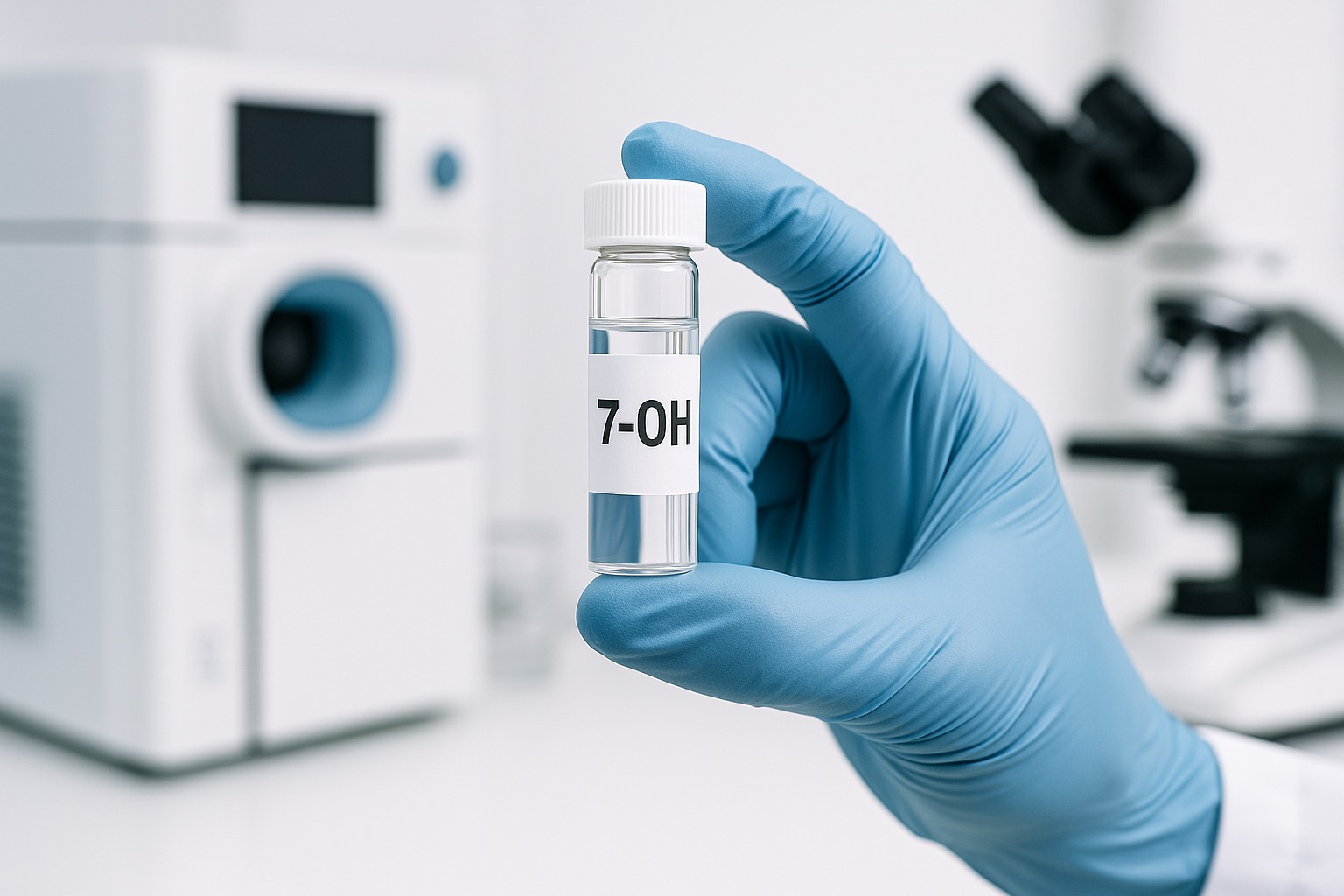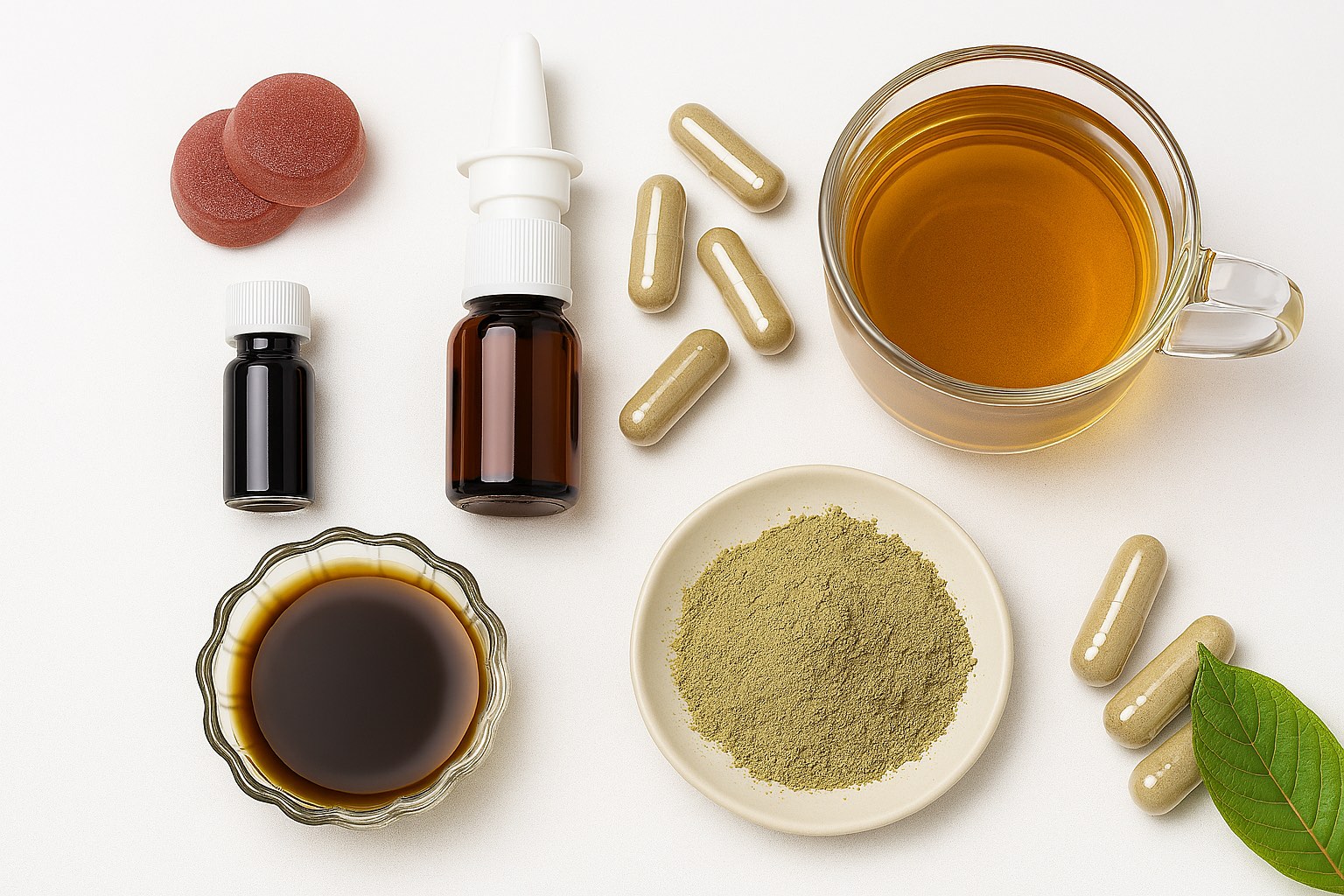⚠️ Disclaimer: This article is provided for informational purposes only and does not constitute legal advice. Readers should consult qualified legal counsel for advice about compliance with federal, state, or local laws related to kratom, 7-hydroxymitragynine (7-OH), or other controlled substances.
Florida has taken a decisive step against kratom sales and possession. On August 19, 2025, the state enacted an emergency rule that classifies 7-hydroxymitragynine (7-OH)—a potent and naturally rare kratom alkaloid—as a Schedule I controlled substance when it exceeds 400 parts per million (ppm) on a dry-weight basis.
This rule marks the first state-level action to set a specific compliance threshold for 7-OH. The rule reaches beyond Florida storefronts, applying equally to interstate online sellers shipping into the state. For brands, the law signals heightened scrutiny and a pressing need to verify compliance through kratom lab testing.
What the New Florida Rule Says
Florida’s emergency rule, 2ER25-2, effective immediately, specifically targets 7-OH. Any kratom product with concentrations above 400 ppm, or .04% on a dry weight basis, is now classified as a Schedule I substance under state law. This designation means the government believes concentrated 7-OH is highly dangerous, with no therapeutic value.
Importantly, the rule does not apply to mitragynine, kratom’s primary alkaloid, which remains legal in natural leaf and standard product formats.
In practice, the rule means:
- Concentrated or manufactured 7-OH products are banned. Florida law now treats kratom isolates, semi-synthetic extracts, and high-potency drink mixes and shots as heroin or LSD. [source]
- Schedule I penalties apply. Retailers, distributors, and consumers face criminal liability for possessing, selling, or distributing non-compliant products. Possession of any Schedule I substance in Florida is itself a felony, typically classified as a third-degree offense, punishable by up to 5 years in prison, 5 years of probation, and a fine of up to $5,000.
- Natural kratom products remain legal. The threshold does not affect unaltered leaf, powder, or capsules with less than 0.04% 7-OH.
Why the Rule Is Historic
Florida’s decision marks a turning point for kratom regulations. Until now, most state policies either banned kratom entirely or imposed labeling and sales restrictions. This is the first time regulators have set a measurable alkaloid limit.
Three key reasons make this rule historic:
- First of its kind. No other state has directly targeted 7-OH or created a compliance threshold until now.
- Federal alignment. The rule reflects FDA guidance that concentrated 7-OH acts like an opioid and increases overdose risk, signaling closer coordination between state and federal regulators. [source]
- Industry precedent. By legally distinguishing mitragynine from 7-OH, Florida signals that brands must focus on mitragynine or natural extracts to remain compliant, setting a model that other states may follow.
Why Lawmakers Took Action
The Florida Department of Agriculture and Consumer Services (FDACS) first raised concerns about kratom a few years ago. Lawmakers responded by passing the Kratom Consumer Protection Act, which restricted marketing, packaging, and sales to minors. But FDACS Commissioner Wilton Simpson kept saying that concentrated 7-OH was “vape shop morphine” and called for stronger controls [source].
At the same time, the FDA recently warned that concentrated 7-OH behaves like an opioid and carries a high risk of overdose. The DEA also began considering whether to add kratom alkaloids, including 7-OH, to the federal Schedule I list.
Following federal statements, Florida Attorney General James Uthmeier escalated the issue in August 2025 by filing an emergency rule. FDA Commissioner Marty Makary and Florida Surgeon General Joseph Ladapo backed the decision, citing rising ER visits and poison control calls linked to kratom extracts.
What This Means for Kratom Sales in Florida
The emergency scheduling forces every retailer in Florida to evaluate the kratom products on their shelves. Any extract or concentrate with 7-OH levels above .04% is now illegal, and the FDACS will start pulling non-compliant products from stores immediately.
Brands that sell isolates or semi-synthetic 7-OH extracts may need to reformulate to stay in the market. Companies that already focus on natural kratom or mitragynine-based extracts may only need to update their Certificates of Analysis (COAs) to prove compliance.
ACS Laboratory supports this process by flagging the new .04% limit in red on kratom COAs, giving retailers, regulators, and consumers a clear line of sight into product safety.
By setting a 7-OH threshold, Florida has introduced the kratom industry to a regulatory model similar to hemp’s delta-9 THC limits. Brands that invest in kratom potency testing, transparency, and reformulation will be best positioned to keep their products on the market.
What About Online Retailers?
The 7-OH ban does not stop at storefronts. Florida’s emergency rule 2ER25-2 also makes it illegal for national online retailers to ship concentrated 7-OH products in the state.
Many national e-tailers already restrict kratom shipments to states with outright bans, such as Indiana and Wisconsin. Online sellers must either block orders from Florida or provide proof that their products fall under the potency limit.
In practice, the rule means:
- Out-of-state online vendors face liability. Shipping 7-OH concentrates into Florida exposes businesses to state enforcement.
- Payment processors may shut down accounts. Retailers who lose services must be ready to pivot quickly to high-risk kratom processors, like Zen Payments or Easy Pay Direct.
- Lab testing is the only safeguard. A COA proving 7-OH levels below 400 ppm is the best way for online kratom brands to maintain access to Florida’s market and payment infrastructure.
How Florida’s 7-OH Ban Impacts Consumers and Research
Florida’s emergency 7-OH scheduling carries direct implications for kratom consumers, advocates, and research communities alike.
Consumers & Advocates
Consumers will still have access to natural kratom leaf and mitragynine-based products. But the rule cuts off access to concentrated 7-OH formulations that some people turned to for pain relief as opioid alternatives.
Advocates from the Holistic Alternative Recovery Trust (HART) argued that early studies suggest a potential role for controlled 7-OH use in reducing opioid overdoses by up to 30%. They warn that a blanket Schedule I classification could harm people using these products responsibly.
Researchers
Researchers studying natural kratom and mitragynine can continue their work without restriction. However, studies on 7-OH in Florida now face Schedule I controls, requiring special approval before labs can handle the compound. These added hurdles could slow scientific progress and limit opportunities to understand kratom’s full pharmacology.
How Can Lab Testing Ensure Compliance?
Florida’s emergency rule puts a spotlight on kratom lab testing. Retailers, distributors, and regulators will rely on the COAs from recent third-party lab tests to confirm whether a batch belongs on store shelves or in the seizure bin.
What ACS is Doing to Support Kratom Brands
ACS Laboratory supports kratom brands through:
- Full-panel alkaloid testing. ACS’s kratom testing panel quantifies both mitragynine and 7-OH levels, alongside other alkaloids, so brands know exactly where their products fall.
- Red-line COAs. To simplify compliance, ACS highlights the new 400 ppm limit in red on every kratom COA, giving brands, retailers, and regulators immediate clarity.
- Accredited authority. ACS Laboratory is ISO/IEC 17025:2017 Accredited by A2LA #6786.01 and DEA registered. These accreditations mean ACS meets rigorous international standards for testing accuracy and is legally authorized to handle and test Schedule I substances.
- Partnership approach. ACS works directly with kratom brands to reformulate products when needed, develop transparent labeling, and prepare for potential regulatory changes in other states.
The Bottom Line
Florida’s action shows that alkaloid-specific limits are here to stay. Brands that act now—by testing, reformulating, and documenting results—will remain compliant in Florida and ahead as other states and federal agencies evaluate 7-OH.
ACS Laboratory is uniquely positioned to help. With DEA registration, national accreditation, and award-winning accuracy, ACS gives kratom brands the tools they need to comply, compete, and build lasting trust with regulators and consumers.
👉 Have questions about kratom testing or compliance? Contact ACS Laboratory today to speak with our team.









.png)




.png)
.png)
.png)
.png)